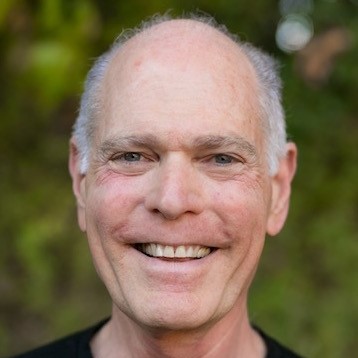The son of Holocaust survivors, Marty Yura believes deeply that trauma lingers, that it resides in the body ... in our cells, and that though it diminishes with time, the impact of that trauma is transferred generationally. His experience in the military as well as the fact of being the son of Holocaust survivors informs the way he teaches yoga to veterans.
Marty Yura is a yoga teacher and co-owner of Vista Yoga. A veteran with a Masters in Psychology, he served as a psychologist in the military for five years. He now teaches yoga to civilians as well as to veterans with PTSD and other physical and mental health conditions through the Emory Healthcare Veterans Program.
For information about PTSD, please visit The Treatment Hub.
Both my parents were Holocaust survivors, and one of my daughters set up a Story Corps, where she interviewed me about my father. She knew my mother, but she never knew my father. And she asked my questions. And I, with a very emotional way, answered her questions because she never knew. And that was very moving. I’m actually writing a book about that, now, about, with another friend, being sons of survivors, of Holocaust survivors and that whole world of how that trauma, how I continue to overcome that trauma. Because it’s not — certainly it’s different from — it’s its own distinct trauma, like common to trauma. It lingers, it resides in the body. It is prompted by the slightest stimulus of however the neuro connections are.
My experience, being the son of Holocaust survivors, and the more and more clear as I delve into this, how much the impact has transferred epi-generationally from my parents’ generation to me. And my daughter and my kids also, they’re part of this whole story as well. That that trauma, although diminished, continues to be transferred to that generation also. So, I have a compassion for people experiencing trauma. Now, that’s a very large population - everybody’s dealing with some kind of trauma. But the people in this program, the military context, I can relate to that very well and I think that does contribute in a big way. And sometimes, I’ll share some things with people. Not in plenary, not in the group. But if somebody does initiate that conversation, that’s a between the-lines-yoga practice, if you will. And I’m careful to be a good soldier, if you will here, and not cross, not do anything over my paygrade. But things enter, little moments do surface. And I think it contributes to people being able to relate one to another, for me to them, from them to me. And maybe raises the slide for them to pursue them a little bit more.
BrainLine is powered in part by Wounded Warrior Project to honor and empower post-9/11 injured service members, veterans, and their families.
About the author: Marty Yura, MA
Marty Yura is a yoga teacher and co-owner of Vista Yoga. A veteran with a Masters in Psychology, he served as a psychologist in the military for five years. He now teaches yoga to civilians as well as to veterans with PTSD and other physical and mental health conditions through the Emory Healthcare Veterans Program.

